
Membrane and Water Treatment
Scope & Guideline
Advancing Knowledge in Membrane and Water Treatment Technologies
Introduction
Aims and Scopes
- Membrane Technology Innovations:
Research dedicated to the development and optimization of various membrane types, including nanofiltration, reverse osmosis, and hybrid systems, aimed at enhancing separation efficiency and reducing fouling. - Water Quality Assessment and Management:
Studies that focus on assessing water quality parameters and developing management strategies that incorporate advanced treatment technologies to address pollutants in various water bodies. - Adsorption and Biosorption Techniques:
Research exploring the use of different adsorbents, including natural and engineered materials, to remove contaminants from water, emphasizing the mechanisms and efficiencies of these processes. - Wastewater Treatment and Resource Recovery:
Investigations into novel methods for treating wastewater and recovering valuable resources, such as nutrients and energy, while minimizing environmental impacts. - Environmental Impact and Sustainability:
Research that evaluates the ecological implications of membrane and water treatment technologies, promoting sustainable practices in water management.
Trending and Emerging
- Integration of Artificial Intelligence (AI):
Recent publications indicate a growing trend towards integrating AI and machine learning techniques in water treatment processes, enhancing data analysis, predictive modeling, and operational efficiencies. - Sustainability and Resource Recovery:
There is an increasing emphasis on sustainable practices and resource recovery from wastewater, including nutrient recovery and energy generation, aligning with global sustainability goals. - Advanced Membrane Materials:
Research is trending towards the development of novel membrane materials, including those incorporating nanomaterials and functionalized surfaces, to improve performance and reduce fouling. - Microplastics and Emerging Contaminants:
The focus on microplastics and other emerging contaminants in water sources is rising, prompting innovative treatment solutions and assessments of their environmental impacts. - Real-Time Monitoring and IoT Applications:
The application of Internet of Things (IoT) technologies for real-time monitoring of water quality and treatment processes is gaining traction, reflecting a shift towards smart water management solutions.
Declining or Waning
- Traditional Water Treatment Methods:
There is a noticeable decrease in publications related to conventional water treatment methods, such as coagulation and sedimentation, as researchers shift towards more advanced and efficient technologies. - Chemical Treatment Processes:
Research focusing on purely chemical treatment processes, such as chlorine disinfection alone, is declining as there is a growing preference for integrated approaches that combine physical, chemical, and biological methods. - Non-Membrane Based Filtration Techniques:
The interest in non-membrane filtration techniques, such as sand and gravel filtration, appears to be waning, likely due to the increased focus on advanced membrane technologies that offer better performance and efficiency.
Similar Journals
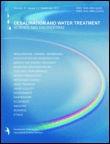
Desalination and Water Treatment
Charting New Waters in Desalination ResearchDesalination and Water Treatment is a pivotal journal in the realm of water science and technology, focusing on the critical issues surrounding water desalination and treatment processes. Published by DESALINATION PUBL in the United States, this journal, with ISSN 1944-3994 and E-ISSN 1944-3986, serves as an essential resource for researchers, professionals, and students engaged in ocean engineering, pollution control, and innovative water management strategies. With a transitional coverage from 2009 to 2024, it holds a respectable position in the third quartile of various categories, including Ocean Engineering, Pollution, and Water Science and Technology, as of 2023. The journal is indexed in Scopus, reflecting its contribution to the field by ranking within the 39th to 45th percentile across relevant subject areas. Although not an open-access publication, it remains a crucial platform for disseminating influential research, thereby enhancing the global repository of knowledge on water treatment methodologies and sustainable practices in desalination.
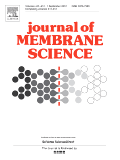
JOURNAL OF MEMBRANE SCIENCE
Pioneering Research in Membrane ScienceJOURNAL OF MEMBRANE SCIENCE, published by Elsevier, is a premier academic journal dedicated to advancing the field of membrane technology and its applications in various scientific domains. With its ISSN 0376-7388 and E-ISSN 1873-3123, this journal is recognized for its significant contributions to the study of filtration, separation processes, and materials science. As of 2023, it boasts an outstanding impact factor, ranking in the Q1 quartile across several categories including Biochemistry, Filtration and Separation, and Physical and Theoretical Chemistry, making it a leading resource in these fields. Researchers benefit from its rigorous peer-review process and the inclusion of breakthrough research, critical reviews, and cutting-edge developments. With converged years spanning from 1976 to 2025, the JOURNAL OF MEMBRANE SCIENCE stands out as an essential platform for professionals, students, and academics eager to explore innovative solutions and findings in membrane science. Although it operates under a traditional access model, its wealth of knowledge and global reach ensure that it remains an indispensable asset for anyone engaged in this dynamic area of study.

ACS ES&T Water
Exploring the intersection of chemistry and environmental science.ACS ES&T Water, published by the American Chemical Society, is a leading peer-reviewed journal focused on the interdisciplinary field of water science and technology. Since its inception in 2021, the journal has rapidly established itself as a prominent platform for research, boasting an impressive impact factor and ranking in the Q1 category across various disciplines, including Chemical Engineering, Chemistry, Environmental Chemistry, and Water Science and Technology. With a current Scopus rank of #66 out of 261 in Environmental Science and a remarkable percentile of 74%, ACS ES&T Water is dedicated to advancing the understanding of water-related challenges and solutions through high-quality research. The journal aims to facilitate communication among researchers, professionals, and policymakers by providing open access to innovative studies and methodologies that address critical issues in water resource management and sustainability. Collaborating at the intersection of chemistry and environmental science, this journal is essential for anyone invested in the future of global water security and innovation.
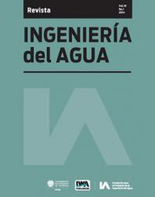
Ingenieria del Agua
Innovating Water Management for a Sustainable TomorrowIngenieria del Agua, published by Universitat Politècnica de València, Editorial UPV, is a prominent open-access journal dedicated to the field of water engineering and management. With its ISSN 1134-2196 and E-ISSN 1886-4996, this journal has been facilitating the dissemination of critical research and innovative practices in water resources since 1994. With a commitment to providing unrestricted access to high-quality research, Ingenieria del Agua aims to serve as a pivotal platform for researchers, professionals, and students alike. Focused on the intersection of hydrology, environmental engineering, and sustainability, the journal encourages submissions that address contemporary challenges in water resource management, promoting advancements that are vital for both ecological conservation and societal needs. By fostering a collaborative academic environment, it plays an essential role in shaping the future of water engineering.

Water Quality Research Journal
Advancing knowledge for a sustainable water future.Water Quality Research Journal, published by IWA PUBLISHING in the United Kingdom, is a vital resource for researchers and professionals in the field of water science and technology. With an ISSN of 2709-8044 and E-ISSN 2709-8052, this journal focuses on the critical examination and advancements in water quality issues, addressing both ecological and human health aspects. As a valued open-access journal, it ensures wide dissemination of research findings and encourages influential discussions among the global scientific community. Ranked in the Q2 category for Water Science and Technology and positioned at #98/261 in Scopus' Environmental Science rankings, the journal is dedicated to publishing high-impact research that fosters innovation and collaboration across various disciplines. By bridging the gap between fundamental research and practical applications, the Water Quality Research Journal plays a pivotal role in advancing our understanding and management of water quality challenges, making it an indispensable tool for academicians, policymakers, and industry leaders alike.

Water Research X
Pioneering research for a water-secure future.Water Research X is a prestigious journal published by ELSEVIER, focusing on the dynamic fields of water science and technology, pollution, ecological modeling, and waste management. Since its inception in 2018, this Open Access journal has become a cornerstone resource for researchers and professionals dedicated to advancing our understanding and management of water resources. Based in the United Kingdom, Water Research X holds an impressive ranking within the Scopus metrics, positioned in the Q1 category across multiple relevant disciplines, including Environmental Science, with a notable rank of 10/261 in Water Science and Technology and 3/41 in Ecological Modeling. This reflects its commitment to disseminating high-quality research that informs policy, supports sustainable practices, and fosters innovation in water management.
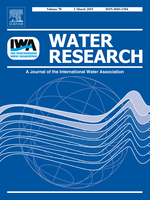
WATER RESEARCH
Empowering researchers to tackle urgent water issues.WATER RESEARCH, published by Pergamon-Elsevier Science Ltd, is a premier international journal dedicated to the advancement of knowledge in the interdisciplinary field of water science and technology. With a significant impact factor, WATER RESEARCH holds a distinguished position, consistently ranking in the top quartile (Q1) across multiple categories including Civil and Structural Engineering, Environmental Engineering, and Pollution. Established in 1967 and set to continue its legacy until at least 2024, this journal provides a vital platform for researchers and professionals to disseminate cutting-edge findings related to water sustainability, quality, and management. Although the journal follows a traditional access model, its commitment to disseminating impactful research ensures that it remains an essential resource for academia and industry alike. With a rigorous selection process, the journal includes articles that significantly contribute to the understanding and resolution of global water-related challenges, making it an invaluable asset for researchers, students, and practitioners engaged in this critical area of study.
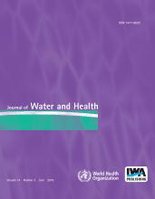
JOURNAL OF WATER AND HEALTH
Advancing global health through innovative water research.The JOURNAL OF WATER AND HEALTH, published by IWA PUBLISHING, serves as a leading platform for disseminating innovative research related to water quality, sanitation, and public health. With its ISSN 1477-8920 and E-ISSN 1996-7829, this esteemed journal significantly contributes to the fields of Public Health, Environmental Science, and Microbiology, as evidenced by its robust rankings in several quartiles, including Q2 in Public Health and Water Science and Technology in 2023. This periodical enjoys a convergence of years from 2003 to 2024, underscoring its continuous relevance in addressing critical global issues such as water safety and infectious diseases. Although not an open-access journal, the insights and findings presented are pivotal for researchers, professionals, and students eager to contribute to the sustainable management of water resources and health improvements worldwide.

Water
Advancing aquatic knowledge for a sustainable future.Water, an esteemed journal published by MDPI, serves as a pivotal resource for global research in the fields of aquatic science, biochemistry, geography, and water science and technology. Since its inception in 2009, this open-access journal has committed itself to advancing knowledge regarding water-related topics by fostering a platform that encourages the dissemination of high-quality research. With its impressive impact factor reflecting its relevance and influence, Water ranks in the top quartiles in various categories, including Q1 in Aquatic Science and Water Science and Technology, showcasing its commitment to publishing cutting-edge findings that resonate deeply with the environmental and biological sciences community. Located in Basel, Switzerland, the journal prioritizes accessibility for researchers, professionals, and students alike, aligning with the broader scientific goal of addressing urgent water challenges through collaborative and interdisciplinary research.

Environmental Science-Water Research & Technology
Leading the charge in global water sustainability.Environmental Science-Water Research & Technology is a premier journal published by the Royal Society of Chemistry that focuses on the latest research and technological advancements in the field of water science and engineering. Since its inception in 2015, the journal has steadily gained recognition for its rigorous peer-review process and commitment to advancing our understanding of fresh, wastewater treatment, and sustainable water management. With a remarkable 2023 impact factor and consistently achieving Q1 status in both Environmental Engineering and Water Science and Technology categories, this journal ranks within the top percentile of its field, underscoring its pivotal role in fostering innovative solutions to global water challenges. Currently listed as Rank #26/261 in Water Science and Technology and Rank #34/197 in Environmental Engineering by Scopus, it provides an essential platform for researchers, professionals, and students alike. The journal embraces a broad spectrum of topics concerning water research, aiming to bridge the gap between scientific understanding and practical application.